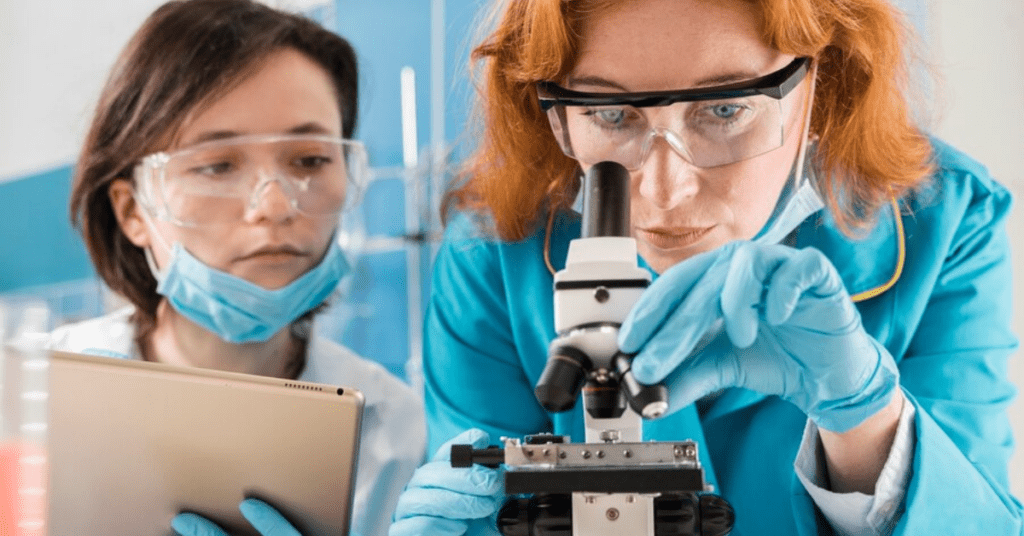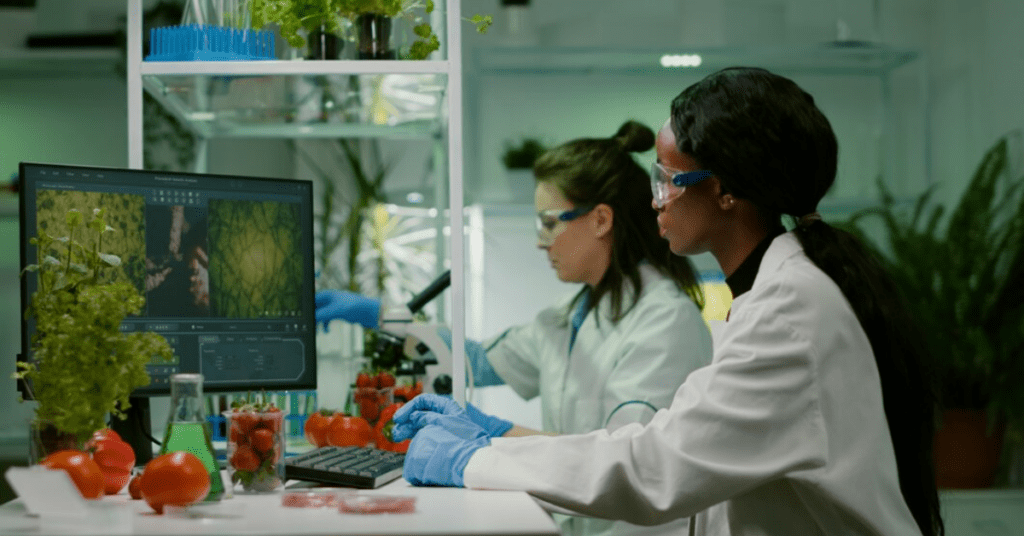13 September 2024
7 minutes read
What Is An MS in Bioinformatics In USA?

Key Takeaways
- An MS in Bioinformatics in the USA equips you with a unique blend of biology and computational skills, opening doors to high-demand industries.
- Top US universities offer comprehensive bioinformatics programs, preparing graduates for roles in healthcare, biotechnology, and research.
- The interdisciplinary nature of bioinformatics creates diverse career opportunities, especially in areas like personalized medicine and big data analysis.
Did you know that the field of MS in bioinformatics in USA is projected to grow by 15% in the next decade in the United States? With advancements in genomics, precision medicine, and data analytics, bioinformatics is becoming a cornerstone of modern healthcare and scientific research.
Despite the booming demand, students often find themselves confused about what an MS in Bioinformatics entails. The variety of programs, differences in curriculum, and required skills can make it difficult to choose the right path. Additionally, the interdisciplinary nature of bioinformatics, combining biology, computer science, and data analytics, can be overwhelming for those unfamiliar with the field.
The good news? Pursuing an MS in Bioinformatics in the USA provides a unique opportunity to specialize in a cutting-edge domain. With the right program, you can gain both the technical expertise and the real-world application needed to thrive in a rapidly evolving industry.
What Is An MS in Bioinformatics?
An MS in Bioinformatics is a graduate-level degree that focuses on the intersection of biology, data science, and computational tools. It equips students with the knowledge to analyze and interpret biological data, making it a key player in fields like genomics, molecular biology, and life sciences. With the increasing complexity of biological data, professionals in this field are in high demand.

In a bioinformatics program, students typically dive deep into computational biology, learning essential skills in computer programming, data analysis, and molecular research. Institutions like Johns Hopkins are known for their strong emphasis on integrating data science with biological studies, preparing graduates to excel in roles that require expertise in both biology and technology.
Why Pursue an MS in Bioinformatics Degree In the USA?
Pursuing a Master of Science in Bioinformatics in the USA is a strategic choice for those looking to enter a rapidly expanding field. US universities offer some of the top bioinformatics programs globally, combining studies in data and computer sciences with biological science areas such as molecular biology, genomic sequencing, and biomedical science. While applying to colleges, make sure you understand the difference between public and private universities in the USA.
These programs provide students with a strong foundation in computational methods, data analysis, and the ability to turn complex data into useful knowledge. There are many reputed distance learning universities in the USA as well. Universities and colleges like Johns Hopkins and Morgan State University offer MS programs that meet the demand for bioinformatics scientists trained in computational biology, preparing students for career opportunities in medical research, biotechnology, and personalized medicine.
In addition to the strong academic training, pursuing an MS in Bioinformatics in the USA offers excellent career prospects. The average salary for bioinformatics professionals is highly competitive, with bioinformatics scientists in high demand across various industries.
Top universities for MS in the US, such as Johns Hopkins, provide students with hands-on experience and opportunities to work with big data in medical and health fields. Most universities require three letters of recommendation, and GRE scores are often necessary to apply. For Indian students, studying MS in Bioinformatics in the USA is a popular choice due to the blend of reputed universities, diverse career opportunities, and exposure to cutting-edge areas of biotechnology. But before getting into the details of the process, make it clear as to whether you need an SAT to study in the USA.
10 Top Universities For MS in Bioinformatics In USA
If you’re considering pursuing an MS in Bioinformatics in the USA, here are 10 top universities known for their strong programs, cutting-edge research, and excellent career opportunities.
| Name of the University | Course Offered | Tuition Fee (per year) |
|---|---|---|
| Johns Hopkins University | MS in Bioinformatics | $58,000 |
| Stanford University | MS in Biomedical Informatics | $56,000 |
| Harvard University | Master of Bioinformatics | $50,420 |
| Massachusetts Institute of Technology (MIT) | Computational Biology MS | $53,790 |
| University of California, San Diego | MS in Bioinformatics and Systems Biology | $33,000 (in-state), $62,000 (out-of-state) |
| Columbia University | MS in Bioinformatics | $63,530 |
| University of Pennsylvania | MS in Computational Biology and Biomedical Sciences | $49,536 |
| University of Michigan, Ann Arbor | MS in Bioinformatics | $49,000 (out-of-state) |
| University of Southern California | MS in Computational Biology and Bioinformatics | $60,446 |
| Georgia Institute of Technology | MS in Bioinformatics | $29,140 (in-state), $39,940 (out-of-state) |
These universities provide students with a strong foundation in bioinformatics, computational biology, and related areas, preparing them for successful careers in both academic and industry settings. There are many affordable universities in the USA that you can apply to.
What Are The Eligibility Requirements For an MS in Bioinformatics In the USA?
To pursue an MS in Bioinformatics in the USA, students must meet specific eligibility requirements that vary from university to university. However, there are common prerequisites that most master’s programs share.
Typically, applicants for a Master of Bioinformatics must hold a bachelor’s degree in a related field, such as biology, computer science, or mathematics. A strong foundation in computational mathematics and biological sciences is highly recommended. Most universities also require a competitive GRE score for MS in Bioinformatics applications, although some may waive this depending on other qualifications. For international students, proof of English language proficiency (like TOEFL or IELTS scores for top universities) is also mandatory. Make sure you use a GPA calculator for MS in the USA for the process.
Applicants should submit three letters of recommendation, a statement of purpose, and a resume. Universities often look for MS students with relevant experience in bioinformatics or related areas, as it demonstrates their readiness to succeed in a challenging master’s program. With the best master’s programs, like those in the top universities for bioinformatics in the US, students are prepared to thrive in both academic research and industry roles.
What Is The Admission Process For Getting Into An MS In Bioinformatics Course In The USA?
The admission process for getting into an MS in Bioinformatics course in the USA typically follows a structured path, though specific requirements can vary by university.
- Research Programs: Start by identifying universities and colleges in the USA offering a strong MS in Bioinformatics program, such as the Johns Hopkins MS in Bioinformatics or an MS in Biomedical Informatics at other top institutions. Review the bioinformatics curriculum to ensure it aligns with your interests, including areas like big data, personalized medicine, and data science. There are many ivy league colleges for MS in the USA as well.
- Submit Application: Applications are typically submitted through the university’s online portal. You’ll need to provide your academic transcripts, demonstrating a solid foundation in areas such as biology, computer science, or related fields.
- Test Scores: Most programs require standardized test scores, such as the GRE score required for MS in the USA. For Indian students or other international applicants, proof of English proficiency, such as TOEFL or IELTS scores, is also necessary.
- Letters of Recommendation and SOP: Most colleges in the USA ask for three letters of recommendation, along with a Statement of Purpose (SOP) outlining your goals, experience, and reasons for pursuing an MS degree in bioinformatics.
- Interview (Optional): Some programs, especially highly competitive ones like Johns Hopkins MS in Bioinformatics, may require an interview to further assess your fit for the program.
After completing these steps, candidates who meet all requirements will be evaluated based on their academic background, test scores, and relevant experience in areas like big data and computational biology. Make sure you stay away from the fraud universities in the USA.
What Are The Career Prospects For International Students After Doing An MS in Bioinformatics In the USA?
After completing an MS in Bioinformatics in the USA, international students have a wide range of career prospects, thanks to the interdisciplinary nature of bioinformatics, which combines computing and informatics with biology. Have a good GPA in USA universities to increase your success rates here. The bioinformatics field provides computational skills that are in high demand across various industries, including healthcare, biotechnology, pharmaceuticals, and academic research.

Graduates can work as bioinformatics scientists, data analysts, or computational biologists. Their role often involves turning complex biological data, such as genomic and molecular biology information, into useful insights for personalized medicine, drug discovery, and medical research. The specific career opportunities may vary from university to university, depending on the program offered and the skills acquired. Also, have a clear idea of the cost of studying in the USA for international students as well.
Moreover, the bioinformatics master’s program provides students with a strong foundation in biology and computational methods, making them eligible for roles in bioinformatics research, clinical data management, and biotechnology innovation. Many graduates also pursue PhD programs or research positions in top biotech firms and universities. With the right computational skills and knowledge, international students can thrive in both academic and industry sectors in the USA and beyond.
Conclusion
Pursuing an MS in Bioinformatics in the USA offers a unique opportunity to blend biology, data science, and computational skills, preparing graduates for a wide range of career opportunities in biotechnology, healthcare, and research. With top universities offering advanced bioinformatics programs, international students can gain the expertise needed to meet the demands of big data, molecular biology, and personalized medicine. The strong foundation provided by these programs paves the way for a successful and rewarding career in this rapidly growing field. There are many affordable universities in the USA which you can choose from.
Explore a world of learning in the USA with Ambitio! Engage with the brightest minds, define your path, and discover your career. Join us for an adventure beyond books – Study in USA. They Secured Their Dream. Are You Next? Dive into the success stories of students who’ve secured spots in some of the most prestigious institutions in the USA. Get inspired, compare profiles, and discover what it takes to join the ranks of these top admits.
FAQs
What are the eligibility criteria for pursuing an MS in Bioinformatics in the USA?
Most universities require an undergraduate degree in a related field, GRE scores, and letters of recommendation. Some may also require English proficiency proof.
How does a Master of Science in Bioinformatics differ from a Master of Bioinformatics?
A Master of Science in Bioinformatics has a stronger emphasis on research and may involve a thesis component, while a Master of Bioinformatics is geared toward practical applications in industries.
What career opportunities are available after an MS in Bioinformatics?
Graduates can work as bioinformatics scientists, computational biologists, genomics analysts, or research scientists in various sectors like pharmaceutical companies, healthcare organizations, and research institutions.
What is the future of Bioinformatics in the USA?
Bioinformatics is poised to grow significantly due to the ever-increasing generation of biological data. Bioinformatics professionals will play a crucial role in interpreting this data for scientific advancements.
Why should one pursue an MS in Bioinformatics in the USA?
The USA offers quality education, cutting-edge research opportunities, and a strong job market. These factors make it a prime destination for pursuing an MS in Bioinformatics.
Are there scholarships available for international students pursuing MS in Bioinformatics?
Many US universities offer scholarships and financial aid options for international students, although availability and eligibility criteria vary.

You can study at top universities worldwide!
Get expert tips and tricks to get into top universities with a free expert session.
Book Your Free 30-Minute Session Now! Book a call now




























